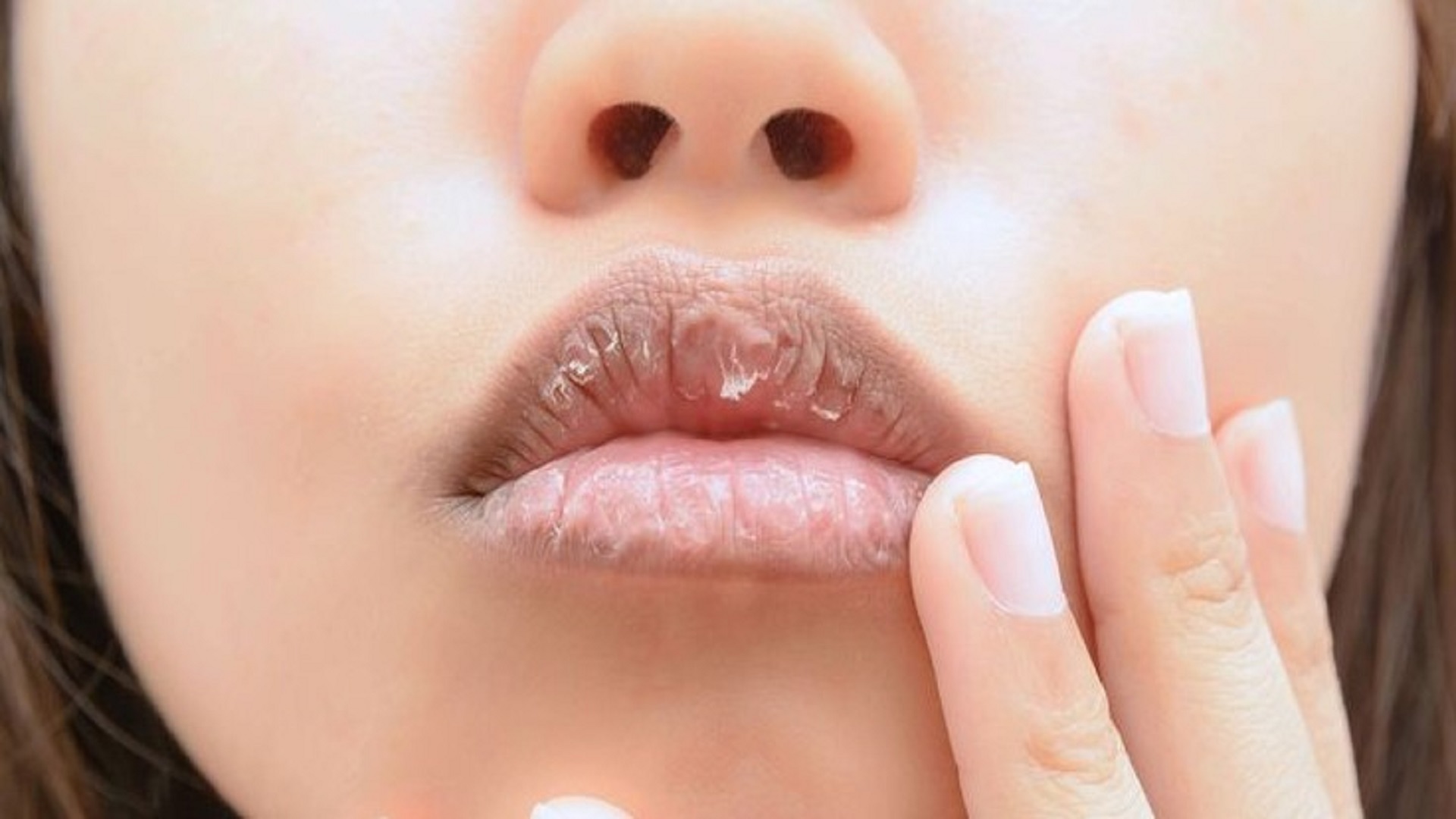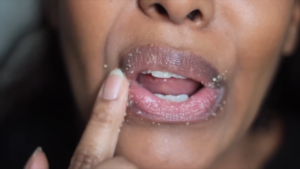Do your lips frequently feel itchy, causing discomfort and distraction? Itching of the lips can stem from various factors, ranging from environmental triggers to underlying health conditions. One common cause is dryness, especially in cold or dry climates, which can lead to chapped and irritated lips. Allergic reactions to certain lip care products, such as lipsticks or lip balms, can also provoke itching. Additionally, exposure to irritants like spicy foods or chemicals can cause temporary itching. Understanding the underlying causes is crucial to effectively treating and preventing lip itching.
Treating itchy lips begins with proper hydration and protection. Using a hydrating lip balm with ingredients like shea butter or coconut oil helps lock in moisture and prevent dryness, reducing the urge to scratch. Avoid products with potential allergens or irritants, such as fragrances or certain dyes, which can exacerbate itching. If your itching persists despite these measures, consult a dermatologist to rule out underlying skin conditions like eczema or allergic reactions. They can recommend specialized treatments, such as prescription creams or ointments, to alleviate symptoms and restore lip health.
Maintaining lip health involves adopting preventive measures to avoid future itching episodes. Regularly moisturizing your lips, especially during harsh weather conditions, helps keep them hydrated and less prone to dryness-induced itching. Choosing lip products formulated for sensitive skin and avoiding excessive licking or biting of the lips also promotes healthy lip care habits. By understanding the triggers and implementing effective treatments and preventive measures, you can effectively manage and alleviate lip itching, ensuring comfort and maintaining smooth, healthy lips.
Understanding the Causes of Lip Itching
Lip itching can disrupt daily activities and often results from a variety of factors. These can include environmental triggers, like dry or cold weather, as well as reactions to skincare products or foods that come into contact with the lips.
Identifying Environmental and Skincare Triggers
Environmental factors such as dry or cold weather can lead to dry, chapped lips, causing discomfort and itching. Using lip balms containing moisturizing ingredients like shea butter or coconut oil can help alleviate symptoms by hydrating the lips and forming a protective barrier against external elements. Avoiding lip care products with allergens such as fragrances or certain dyes can also prevent irritation and reduce itching. If symptoms persist, consulting a dermatologist is advisable to diagnose and treat underlying conditions like eczema or allergies, ensuring effective relief and lip health.
Lip itching can disrupt daily activities and often results from a variety of factors. These can include environmental triggers, like dry or cold weather, as well as reactions to skincare products or foods that come into contact with the lips.
- Identifying Environmental Triggers
Dry or cold weather can severely impact lip health, leading to dryness and chapping. Exposure to harsh environmental conditions can strip the lips of moisture, causing discomfort and itching. Using a lip balm enriched with emollients such as shea butter or almond oil creates a protective barrier, locking in moisture and shielding against external elements. Regular application during colder months helps maintain lip hydration, preventing dryness-induced itching and promoting smooth, supple lips.
- Avoiding Allergens in Lip Care Products
Many lip care products contain potential allergens like fragrances or artificial dyes, triggering allergic reactions and exacerbating lip itching. Opting for hypoallergenic lip balms or natural formulations reduces the risk of irritation and sensitivity. Ingredients like beeswax or lanolin provide gentle hydration without causing adverse reactions. If allergic symptoms persist despite using allergen-free products, consult a dermatologist for allergy testing and personalized recommendations to manage lip itching effectively.
- Recognizing Skincare Product Reactions
Certain skincare products, including lipsticks, lip glosses, and toothpaste, may contain ingredients that irritate the delicate lip skin, leading to itching and discomfort. Pay attention to product labels and avoid items with known irritants such as menthol, camphor, or propylene glycol. Switching to gentle, non-comedogenic lip products formulated for sensitive skin minimizes the risk of adverse reactions and supports overall lip health. If persistent itching occurs, discontinue use and seek medical advice to identify specific allergens and prevent future incidents.
- Consulting a Dermatologist for Persistent Symptoms
When lip itching persists despite home remedies and product changes, consulting a dermatologist is essential for accurate diagnosis and treatment. Dermatologists can perform comprehensive evaluations to identify underlying causes such as eczema, contact dermatitis, or fungal infections. They may prescribe medicated ointments, antihistamines, or corticosteroids to alleviate symptoms and restore lip health. Additionally, dermatological advice helps develop a tailored skincare regimen and preventive strategies to manage chronic lip itching effectively. Seeking professional guidance ensures proper care and promotes long-term relief from persistent lip discomfort.
Effective Home Remedies for Lip Itching
Managing lip itching at home starts with maintaining proper lip hydration. Regularly applying a soothing lip balm enriched with natural moisturizers like beeswax or cocoa butter can help alleviate dryness and itching. Another effective remedy is applying a cool compress or gently massaging the lips with aloe vera gel to reduce inflammation and discomfort. Additionally, staying hydrated by drinking plenty of water helps maintain overall skin health, including the lips. These simple yet effective home remedies can provide relief from lip itching and promote smooth, healthy lips.
When dealing with lip itching at home, incorporating simple remedies can provide relief and promote lip health. These remedies focus on soothing irritation and maintaining hydration to alleviate discomfort effectively.
- Using Moisturizing Lip Balms
Regularly applying a moisturizing lip balm enriched with natural emollients such as beeswax or cocoa butter is a fundamental step in combating lip itching. These ingredients help to hydrate the lips deeply, forming a protective barrier against environmental triggers that can exacerbate dryness and itching. Choose a balm free from potential allergens like fragrances or artificial dyes to minimize the risk of irritation. Apply the lip balm throughout the day and before bedtime to keep your lips moisturized and alleviate itching.
- Applying Cool Compresses
Applying a cool compress to the lips can effectively reduce inflammation and soothe itching. Use a clean cloth soaked in cold water or wrap ice cubes in a soft towel before gently pressing it against the lips. The cold temperature helps constrict blood vessels, reducing swelling and discomfort associated with itching. Alternatively, applying aloe vera gel, known for its soothing properties, can also alleviate irritation. Aloe vera gel can be applied directly to the lips and left on for a few minutes before gently rinsing with lukewarm water. Incorporating these cooling treatments into your skincare routine provides immediate relief and promotes healing for irritated lips.
- Maintaining Hydration
Staying hydrated is essential for overall skin health, including the lips. Drink plenty of water throughout the day to maintain moisture levels and prevent dehydration, which can exacerbate lip dryness and itching. Hydration from within helps support the skin’s natural barrier function, reducing the likelihood of environmental factors causing irritation. Additionally, consider using a humidifier in dry indoor environments to add moisture to the air, benefiting both skin hydration and overall well-being. By prioritizing hydration through both internal and external measures, you can effectively manage lip itching and maintain smooth, healthy lips.
- Seeking Relief with Natural Remedies
Natural remedies such as coconut oil or honey can provide additional relief from lip itching. Coconut oil contains nourishing fatty acids that penetrate deeply into the skin, moisturizing and soothing irritated lips. Apply a small amount of coconut oil to the lips several times a day to keep them hydrated and reduce itching. Similarly, honey possesses antibacterial and anti-inflammatory properties that help heal and protect the lips. Apply a thin layer of honey to the lips and leave it on for 10-15 minutes before rinsing off with lukewarm water. These natural remedies offer gentle yet effective solutions for managing lip itching and promoting overall lip health.
Professional Treatments for Persistent Lip Itching
When home remedies aren’t sufficient, seeking professional treatment is crucial. Dermatologists can prescribe medicated ointments or creams tailored to treat underlying skin conditions causing lip itching, such as eczema or allergic reactions. They may also recommend allergy testing to identify specific triggers and advise on lifestyle adjustments to prevent recurrence. For severe cases, advanced treatments like phototherapy or oral medications may be necessary to manage chronic lip itching effectively. Consulting a dermatologist ensures comprehensive care and personalized treatment options to restore lip health and alleviate discomfort.
Conclusion: Understanding and Managing Lip Itching
Lip itching can arise from a variety of factors, including environmental triggers like dry weather, allergic reactions to lip care products, and exposure to irritants. Properly treating and preventing lip itching begins with maintaining hydration and using suitable lip balms to moisturize and protect against dryness. Avoiding allergens in lip products and seeking dermatological advice for persistent symptoms are essential steps in managing lip discomfort effectively. By adopting these strategies and incorporating gentle home remedies like cool compresses and natural moisturizers, individuals can alleviate lip itching, promote lip health, and enjoy comfortable, smooth lips year-round.








